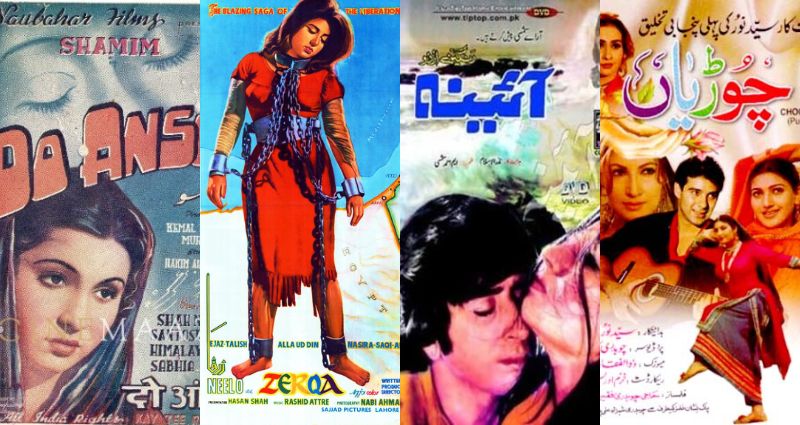The entertainment industry across the world has been from time to time used to convey an agenda with political undertones. Some may even call it propaganda, although the use of the term has become quite ambiguous over the years.
Films, in particular, have proved as an effective tool to promote certain values and ideas. A great example of this would be the 1915 American silent film The Birth Of A Nation that shows the Ku Klux Klan in a positive light and explicitly depicts African Americans as villains, which, one can conclude, has definitely contributed to creating the racial divide that America is battling with today.
In Pakistan, filmmakers have sporadically, in one way or the other, toyed with themes based around political and social agenda
However, in its nascent years, the film industry was mainly dominated with romantic narratives. It was in the 1960’s when a handful of films took on a political voice.
Riaz Shahid, father of renowned actor Shan was perhaps the first to direct ideological films. While not a socialist himself, Riaz Shahid used to frequent progressive circles in that era, meeting the likes of Habib Jalib and Faiz Ahmed Faiz. At the time, the left had a sympathetic attitude to wards Palestine cause.
In films like Zarqa, Farangi, and Yeh Aman, Riaz Shahid inspired by the ideas Jalib and Faiz discussed the Arab-Israel conflict. Interestingly Faiz even penned the lyrics for some song used in these films. Zarqa became a topic of controversy when its distribution rights in the Middle East were offered to the Palestinian Guerrilla outfit, Al-Fateh. This obviously did not sit well with the much capitalistic Ayub Khan regime.
During the 1970’s, the state began to exercise some level of control over the content being produced by filmmakers
In 1971, for instance, the makers of the film Tehzeeb were asked to include a reference to Misr(Egypt) in one of the songs as part of diplomacy with Egypt. However, for the most part, themes were generally apolitical in movies. In fact, after Riaz Khan, movies that carried forward an idealogue were largely absent.
It was in the late 1970’s however, that politics became once again part of the conversation. Albeit this time around it was in a rather grotesque way.
By the end of the of the 70’s General Zia-ul-haq had taken over the government and the process of Islamization had begun
Given the presence of dance, music and other practices that could be taken as provocative, certain bans were imposed on the film industry. Film producers had to get registered with the Ministry of Culture and were required to keep a sum as a guarantee. Certain writers and directors were even blacklisted during this time period.
As a result, filmmakers began to produce stories that banked on patriotism and love for religion and disregarded good story-telling
There was Khak Aur Khoon released in 1979 that was about the partition and atrocities faced by Muslims of Sub-Continent. Then there was Sargam released in 1981 that had a rather absurd approach.
https://www.youtube.com/watch?v=qhw99cvPwwo&t=11s
The story is about a thief in an unknown village with Hindu majority who after converting to Islam begins a crusade to bring everyone into the fold. Dressed as an Arab Sheikh now the man gets into trouble with crooked Hindu law enforcement after which a fight ensues and in the ensuing revealed as the story of Pakistan.
Then Sultan Rahi’s films, while mainly being about an average joe taking on the system, always brought up patriotism and religion into their story. The irony is that these films had dance sequences and songs that would otherwise be deemed vulgar.
This trend continued well in the 1990’s and beyond, even after Zia’s death
In 1990 after Salman Rushdie published Satanic Verses, a movie called International Gorrilay came out. In the movie, Salman Rushdi, being portrayed by Afzal Ahmed, is shown as the villain whose aim to destroy Islam through alcohol and casinos.
A spiritual sequel of sorts that came years later known as Aalmi Gunday had a similar theme as well minus Salman Rushdie. Almost all action movies in the decade tried to bring up the Islam and Pakistan regardless of whether it had to do anything with the message.
The ‘revival’ of Pakistani Cinema during the late 2000’s saw a change in tone only for a little while
Shoaib Mansoor, through Khuda Kay Liye and then Bol, touched on rather taboo topics giving a counter idealogue of sorts to the conservative mainstream. More recently, action-packed films that glorify the armed forces have come up. The narrative depicting terrorists as paid RAW and CIA agents, playing down the Islamic extremism aspect. In essence, the message still being about patriotism and the plight of Muslims.
The peddling of certain ideas and values by the state, through its art, isn’t an unknown phenomenon, nor is it limited to Pakistan. What is an interesting observation, however, is how Pakistan’s cinema has evolved through the years – in terms of story-telling, technical prowess and idea-peddling – because of the state-sponsored values that were brought to the masses through cinema.




